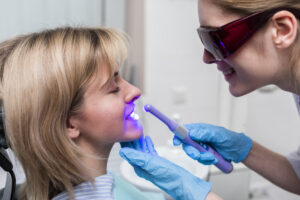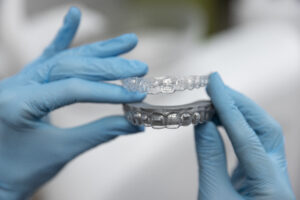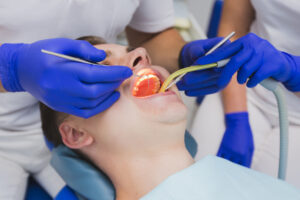Pregnancy is a time of incredible change, full of excitement, preparation, and anticipation. It’s simple to let certain aspects of your health suffer while you concentrate on designing the ideal nursery and choosing tiny clothes. But during these nine months, your oral health is one area that needs extra care. Maintaining a healthy smile is only one aspect of dental care during pregnancy; it’s an essential part of your overall prenatal care and can affect the health of both you and your unborn child.
Morning sickness, dietary changes, and hormonal fluctuations can all combine to cause dental issues. Many women are not aware that neglecting their gums and teeth can result in more serious issues than just a cavity, which could have an impact on how their pregnancy turns out. A healthy journey to motherhood requires an understanding of these risks and the ability to manage them.
The Unique Oral Health Challenges of Pregnancy
Your body goes through a series of changes during pregnancy to support the developing life inside of you. Your mouth, teeth, and gums may be significantly impacted by these hormonally based changes, which may increase your vulnerability to certain dental conditions.
How Hormones Affect Your Gums
There is a scientific explanation for why pregnant women may experience bleeding gums. When your hormone levels increase, such as when you have more progesterone or estrogen, more blood flows to your gums. This makes your gums more vulnerable to the bacteria present in plaque.
Pregnancy Gingivitis
Pregnancy gingivitis, an inflammation of the gums, can result from this increased sensitivity. Gums that are swollen, tender, and more prone to bleeding when brushing or flossing are among the symptoms, which typically manifest in the second trimester. Gingivitis can develop into periodontitis, a more severe type of gum disease that involves infection of the bone and ligaments supporting your teeth and can result in tooth loss if left untreated.
The Increased Risk of Tooth Decay
In addition to gum disease, pregnant women frequently have an increased risk of cavities. This is caused by several different factors rather than the old myth that the baby “steals” calcium from the mother’s teeth.
Dietary Changes and Cravings
Changes in eating habits are common during pregnancy. Your teeth may be exposed to decay-causing acids more frequently throughout the day if you snack more frequently or have cravings for foods high in sugar or carbohydrates.
The Impact of Morning Sickness
Your dental health may suffer if you have morning sickness, especially if you throw up a lot. Strong stomach acids that are present when you vomit can erode the enamel layer that protects your teeth. The teeth become weaker and more susceptible to decay as a result of this erosion. Avoid brushing your teeth right away after vomiting because this can scratch the enamel that has been weakened by the acid. To counteract the acid, rinse your mouth with water or a solution of water and one teaspoon of baking soda. Delaying brushing for at least 30 to 60 minutes is recommended.
Lapses in Oral Hygiene
Pregnant women may become less conscientious about their daily brushing and flossing routines due to pregnancy discomforts like sore gums, a sensitive gag reflex, or just plain tiredness. Plaque buildup may result from this, raising the risk of cavities and gingivitis even more.
Why Your Dental Health Matters for Your Baby
In addition to keeping you comfortable, practicing good oral hygiene during pregnancy is essential for safeguarding the developing baby’s health. Pregnancy outcomes and a mother’s dental health are significantly correlated.
The Connection Between Gum Disease and Pregnancy Complications
Unfavorable pregnancy outcomes have been linked to poor oral health, particularly advanced gum disease (periodontitis). There is evidence linking periodontitis to a higher risk of:
- Premature birth: Delivering a baby before 37 weeks of gestation.
- Low birth weight: A baby weighing less than 5.5 pounds at birth.
- Pre-eclampsia: A serious pregnancy complication characterized by high blood pressure.
The most widely accepted explanation for this link is that oral bacteria from a gum infection may enter the mother’s circulation and possibly make their way to the uterus, where they may cause inflammation and result in these issues. Ignoring dental problems could put you and your unborn child at serious risk.
The Importance of Professional Dental Care During Pregnancy
Considering the possible hazards, getting professional dental care while pregnant is a proactive measure to ensure a healthy pregnancy. In addition to being safe, routine cleanings and examinations are strongly advised.
Safe Dental Treatments
There is a widespread misperception that all dental procedures should be avoided while pregnant. In actuality, a lot of processes are secure and necessary to avoid issues.
- Examinations and Cleanings: Gingivitis prevention and plaque control depend on routine cleanings and examinations. To evaluate your oral health, it is best to make an appointment early in your pregnancy.
- Crowns and Fillings: In order to avoid infection, cavities and broken teeth must be treated. These procedures can be safely carried out by your dentist.
- X-rays and anesthesia: Both you and your unborn child can safely use local anesthetics to numb your mouth. If required for a diagnosis, dental X-rays are also regarded as safe when properly shielded.
It’s crucial to let your dentist know you’re expecting so they can take all the necessary precautions. Cosmetic or non-urgent procedures can frequently wait until after the baby is born, but necessary treatments shouldn’t be postponed.
A Proactive Health Strategy
A nutritious diet is also crucial. In addition to supporting your dental health, eating foods high in calcium, phosphorus, and vitamins A, C, and D will help your baby’s teeth develop normally, which starts around week five of pregnancy. Your first line of defense is to maintain a regular at-home regimen of flossing once a day and brushing twice a day with fluoride toothpaste. If you have sensitive gums, using a toothbrush with soft bristles can help. Maintaining your dental health is essential to your pregnancy and will help you and your unborn child get off to a healthy start.




